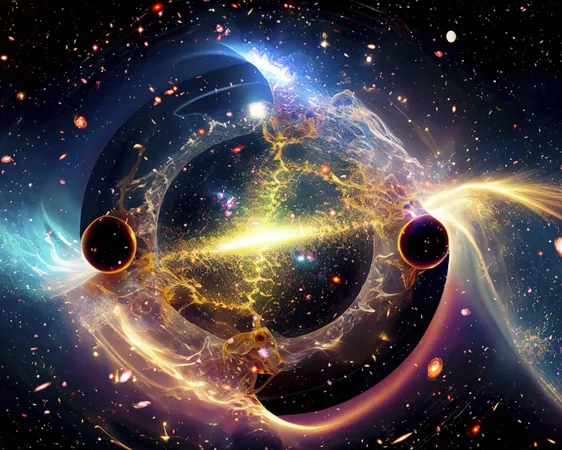
Revolutionary Theory Bridges Einstein's Relativity and Quantum Mechanics
2025-06-24
Author: Ming
For over a century, the realms of quantum mechanics and Einstein's general relativity have shaped our comprehension of the universe — one delving into the minuscule particle world and the other revealing the intricacies of gravity and space. Despite their individual triumphs, merging these two theories has remained one of science's most perplexing enigmas.
A groundbreaking new theory from researchers at University College London (UCL) challenges the conventional narrative. Instead of modifying Einstein’s framework to conform to quantum principles, they propose a fresh perspective: a 'postquantum theory of classical gravity' that seeks to redefine the relationship between gravity and the quantum universe.
Quantum mechanics is built on unpredictability and the bizarre behavior of subatomic entities, giving rise to our modern technological marvels. Meanwhile, general relativity offers a majestic lens through which we view the cosmos, depicting planets and stars as sculptors of spacetime that generate gravitational effects.
However, unifying these distinct paradigms has proven difficult. Attempts to combine them often result in mathematical inconsistencies and collapsed models. Despite years of painstaking research, a cohesive framework eludes physicists.
Shattering the Divide: A Revolutionary Proposition
What distinguishes UCL’s proposal is its radical approach: it does not force gravity into a quantum box. Instead, it explores novel interactions between classical gravity and quantum systems, paving the way for previously uncharted theories.
The research team poses an intriguing question: "What if gravity isn't the problem? What if it's the quantum perspective that needs a reevaluation?" This question is central to their innovative approach.
If validated, this theory could revolutionize our perception of the universe. It suggests a path forward that respects the principles of both gravity and quantum mechanics, potentially unraveling one of physics' most stubborn conundrums.
Reimagining Spacetime: A Classical Groundwork
Led by Professor Jonathan Oppenheim, the UCL team has unveiled a paradigm shift in how spacetime is viewed. Their simultaneous publications introduce a theory positing that spacetime may remain fundamentally classical, unaffected by quantum phenomena.
This novel theory, detailed in a paper in Physical Review X (PRX), proposes that rather than altering spacetime, we should adjust our understanding of quantum mechanics to account for random fluctuations inherent in spacetime. Interestingly, it implies that these fluctuations could render the weight of objects unpredictably volatile.
To substantiate their claims, the researchers advocate for ambitious experiments designed to detect mass fluctuations over time. For example, if a standard 1 kg mass shows variations smaller than the necessary thresholds for mathematical consistency, it would present significant challenges to their theory.
A Five-Year Odyssey of Discovery
The UCL research group, with Professor Oppenheim at the helm, has devoted five years to perfecting their approach, meticulously analyzing its implications from diverse perspectives.
As Oppenheim explains, "The mathematical incompatibility of quantum theory and Einstein's general relativity begs for a resolution to this contradiction." Their extensive exploration seeks to penetrate the essence of gravity and the cosmos, continuously challenging established beliefs.
Broadening Horizons: Beyond Gravity's Reach
While the postquantum theory's primary goal is harmonizing quantum mechanics with general relativity, its implications stretch far-reaching. One striking effect is the dissolution of the contentious 'measurement postulate' that has long baffled physicists — the idea that measuring a quantum state collapses it into a definitive state.
In this new framework, quantum states localize naturally through their engagement with classical spacetime, eliminating the need for the measurement postulate altogether.
Confronting the Black Hole Paradox
Professor Oppenheim’s journey to this breakthrough was partially fueled by the quest to resolve the black hole information paradox. Standard quantum theory holds that information cannot vanish, implying that objects falling into black holes must eventually radiate that information back out — a notion that contradicts general relativity’s assertion that such objects become forever inaccessible once past the event horizon.
The postquantum theory introduces a novel outlook, suggesting that spacetime’s inherent unpredictability permits the destruction of information, potentially reconciling this long-standing paradox.
The Future of Physics: A Dance Between Quantum and Classical
An additional proposal aims to explore the quantum nature of spacetime through 'gravitationally mediated entanglement.' While these experiments face significant hurdles, they offer vast potential for deepening our grasp of nature's ultimate truths.
Professor Sougato Bose, an expert in this field who has previously suggested similar experiments, emphasized their crucial relevance: "Such experiments require extensive resources but are pivotal to unraveling fundamental laws of nature. I believe answers may emerge within the next two decades."
At the crux of this theory lie delicate interactions between quantum particles and classical spacetime fluctuations. These unobserved fluctuations, if the theory is correct, could significantly impact the behavior of quantum entities, making the pursuit of understanding spacetime’s nature more crucial than ever.
As Oppenheim succinctly states, "We now possess a consistent fundamental theory where spacetime remains unquantized — it's anyone's guess where this will lead us." The unfolding narrative in physics has never seemed more exhilarating.



 Brasil (PT)
Brasil (PT)
 Canada (EN)
Canada (EN)
 Chile (ES)
Chile (ES)
 Česko (CS)
Česko (CS)
 대한민국 (KO)
대한민국 (KO)
 España (ES)
España (ES)
 France (FR)
France (FR)
 Hong Kong (EN)
Hong Kong (EN)
 Italia (IT)
Italia (IT)
 日本 (JA)
日本 (JA)
 Magyarország (HU)
Magyarország (HU)
 Norge (NO)
Norge (NO)
 Polska (PL)
Polska (PL)
 Schweiz (DE)
Schweiz (DE)
 Singapore (EN)
Singapore (EN)
 Sverige (SV)
Sverige (SV)
 Suomi (FI)
Suomi (FI)
 Türkiye (TR)
Türkiye (TR)
 الإمارات العربية المتحدة (AR)
الإمارات العربية المتحدة (AR)